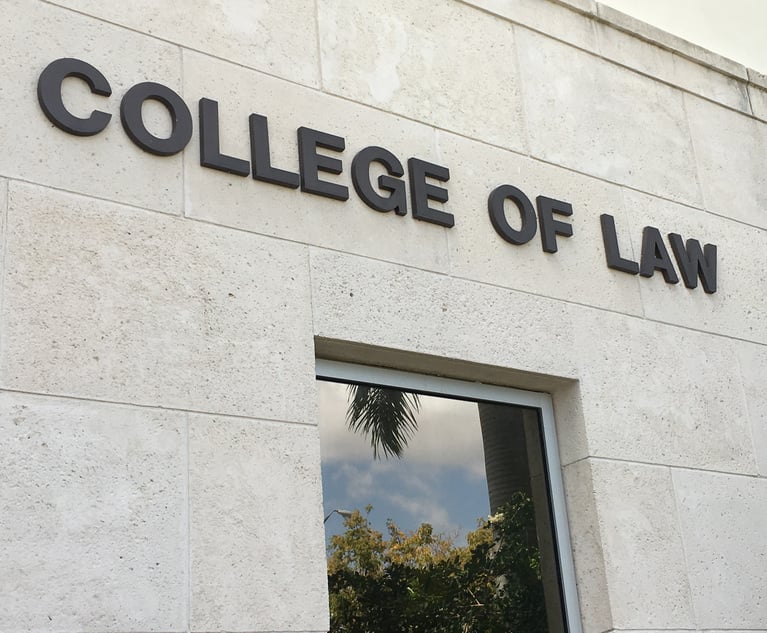Game of Life Copyright Dispute Meets 'Day of Reckoning'
On a trip to the Ninth Circuit, U.S. District Judge William Smith of Rhode Island took a short detour to hear live testimony from three 90-something-year-old witnesses to resolve a 50-year-old copyright dispute over the Game of Life.
January 30, 2019 at 01:52 PM
4 minute read
 (Photo: Morgan via Flickr)
(Photo: Morgan via Flickr)
Judge William Smith's 25-page opinion issued Friday settles a beef that had pitted toy developer Reuben Klamer, TV celebrity Art Linkletter and Hasbro against Klamer's former business partner Bill Markham.
Markham's heirs were seeking to acquire the copyright that Klamer licensed to the Milton Bradley Co., which is now owned by Hasbro, in 1959. Smith flew to Los Angeles during a bench trial to take live testimony from Klamer, now 96, and two former employees of Markham who created the game prototype and its initial rules and box cover.
“Like the Game of Life itself, this fifty-nine-year tug-of-war for renown and royalties has followed a long, circuitous path,” Smith wrote. His conclusion is styled in Game of Life parlance as the parties' “Day of Reckoning.” The result: Markham's heirs cannot ascend to “millionaire acres.”
Markham Concepts v. Hasbro is a win for Lathrop Gage partner Erica Van Loon, who represented Klamer along with Patricia Glaser of Glaser Weil Fink Howard Avchen & Shapiro.
Van Loon said Smith was eager to hear directly from Klamer and Markham's two employees, Grace Chambers and Leonard Israel, who are also in their 90s and live in California. So he scheduled their testimony while on a visit to Pasadena, California to sit by designation at the Ninth Circuit.
“He said 'I'm coming to Los Angeles and I really want to hear live testimony from these witnesses,'” Van Loon said. The judge and his clerk arranged to borrow a courtroom in the Central District of California's First Street courthouse.
“Just being able to hear them live and not by video, I think made a tremendous difference in the case,” Van Loon said.
Smith wrote that he found Chambers and Israel, who had no financial interest in the outcome, especially credible and that Klamer corroborated their testimony.
Smith found that Klamer and Markham contributed the big ideas, such as the game being played on a circuitous path with three-dimensional objects. Chambers, Israel and Markham's wife, Sue, created the game's physical prototype. The work was performed “at the instance and expense” of Klamer, Smith found.
Klamer, Markham and Linkletter then pitched Milton Bradley executives on the game at Chasen's restaurant in West Hollywood in August 1959. The deal was sealed a few months later, when a company owned by Klamer and Linkletter licensed the game to Milton Bradley for a 6 percent royalty on sales, while Markham in turn accepted a 30 percent share of those payments.
“The Game, an instant classic, sold like crazy, and is still a source of revenue for Milton Bradley's successor-in-interest Hasbro,” Smith wrote. “The ensuing 'Pay Day!' has sometimes been the cause of consternation, however.”
Within a few years, Markham was complaining to Klamer that his share was “ridiculously low” and that Linkletter hadn't fulfilled his obligations to promote the game. Klamer replied that the deal “was and is a fair one,” but agreed to pay Markham 50 percent of the royalties on overseas sales. The two ended up litigating the issue of foreign sales in the 1980s.
Markham died in 1993. His heirs sued in 2015, invoking a provision of the Copyright Act of 1976 that allows authors to terminate licenses after 56 years in certain circumstances.
But that provision excludes works for hire, and Smith concluded that the Game of Life is a work for hire that was commissioned by Klamer and produced by Markham's company. “The weight of the evidence in this case is that the success that met the Game of Life was, in fact, nothing if not the result of collective effort,” Smith concluded. “And although the credit, in the colloquial sense, can be split pro rata, the law dictates that the copyrights cannot be.”
Holland & Knight represented Hasbro while Thompson Coburn and Hinckley, Allen & Snyder represented Linkletter's heirs and successors-in-interest.
Van Loon said her client is pleased that the decades-long dispute can now be put to rest. “I think Reuben has some peace now,” she said.
This content has been archived. It is available through our partners, LexisNexis® and Bloomberg Law.
To view this content, please continue to their sites.
Not a Lexis Subscriber?
Subscribe Now
Not a Bloomberg Law Subscriber?
Subscribe Now
NOT FOR REPRINT
© 2025 ALM Global, LLC, All Rights Reserved. Request academic re-use from www.copyright.com. All other uses, submit a request to [email protected]. For more information visit Asset & Logo Licensing.
You Might Like
View All
State Appellate Court Settles Fee Battle Between Former Co-Counsel in Patent Litigation
5 minute read

Justified Termination Does Not Bar Associate Attorney From Unemployment Benefits, State Appellate Court Rules
5 minute read
Florida Law Schools Are Seeing a Bump in Applications for 2025, After Recent Declines at Flagship Schools
3 minute readTrending Stories
- 1States Accuse Trump of Thwarting Court's Funding Restoration Order
- 2Microsoft Becomes Latest Tech Company to Face Claims of Stealing Marketing Commissions From Influencers
- 3Coral Gables Attorney Busted for Stalking Lawyer
- 4Trump's DOJ Delays Releasing Jan. 6 FBI Agents List Under Consent Order
- 5Securities Report Says That 2024 Settlements Passed a Total of $5.2B
Who Got The Work
J. Brugh Lower of Gibbons has entered an appearance for industrial equipment supplier Devco Corporation in a pending trademark infringement lawsuit. The suit, accusing the defendant of selling knock-off Graco products, was filed Dec. 18 in New Jersey District Court by Rivkin Radler on behalf of Graco Inc. and Graco Minnesota. The case, assigned to U.S. District Judge Zahid N. Quraishi, is 3:24-cv-11294, Graco Inc. et al v. Devco Corporation.
Who Got The Work
Rebecca Maller-Stein and Kent A. Yalowitz of Arnold & Porter Kaye Scholer have entered their appearances for Hanaco Venture Capital and its executives, Lior Prosor and David Frankel, in a pending securities lawsuit. The action, filed on Dec. 24 in New York Southern District Court by Zell, Aron & Co. on behalf of Goldeneye Advisors, accuses the defendants of negligently and fraudulently managing the plaintiff's $1 million investment. The case, assigned to U.S. District Judge Vernon S. Broderick, is 1:24-cv-09918, Goldeneye Advisors, LLC v. Hanaco Venture Capital, Ltd. et al.
Who Got The Work
Attorneys from A&O Shearman has stepped in as defense counsel for Toronto-Dominion Bank and other defendants in a pending securities class action. The suit, filed Dec. 11 in New York Southern District Court by Bleichmar Fonti & Auld, accuses the defendants of concealing the bank's 'pervasive' deficiencies in regards to its compliance with the Bank Secrecy Act and the quality of its anti-money laundering controls. The case, assigned to U.S. District Judge Arun Subramanian, is 1:24-cv-09445, Gonzalez v. The Toronto-Dominion Bank et al.
Who Got The Work
Crown Castle International, a Pennsylvania company providing shared communications infrastructure, has turned to Luke D. Wolf of Gordon Rees Scully Mansukhani to fend off a pending breach-of-contract lawsuit. The court action, filed Nov. 25 in Michigan Eastern District Court by Hooper Hathaway PC on behalf of The Town Residences LLC, accuses Crown Castle of failing to transfer approximately $30,000 in utility payments from T-Mobile in breach of a roof-top lease and assignment agreement. The case, assigned to U.S. District Judge Susan K. Declercq, is 2:24-cv-13131, The Town Residences LLC v. T-Mobile US, Inc. et al.
Who Got The Work
Wilfred P. Coronato and Daniel M. Schwartz of McCarter & English have stepped in as defense counsel to Electrolux Home Products Inc. in a pending product liability lawsuit. The court action, filed Nov. 26 in New York Eastern District Court by Poulos Lopiccolo PC and Nagel Rice LLP on behalf of David Stern, alleges that the defendant's refrigerators’ drawers and shelving repeatedly break and fall apart within months after purchase. The case, assigned to U.S. District Judge Joan M. Azrack, is 2:24-cv-08204, Stern v. Electrolux Home Products, Inc.
Featured Firms
Law Offices of Gary Martin Hays & Associates, P.C.
(470) 294-1674
Law Offices of Mark E. Salomone
(857) 444-6468
Smith & Hassler
(713) 739-1250








